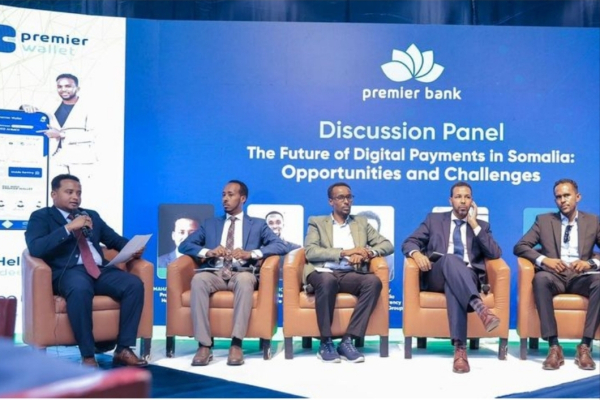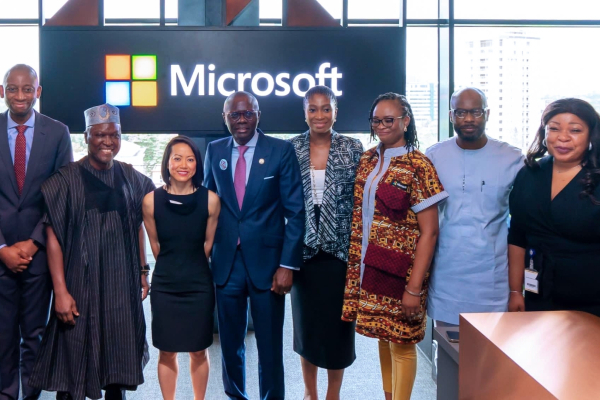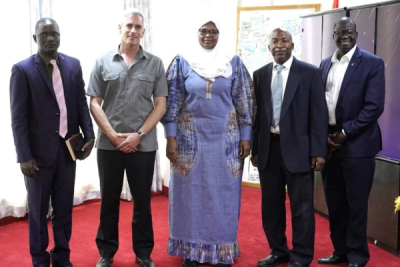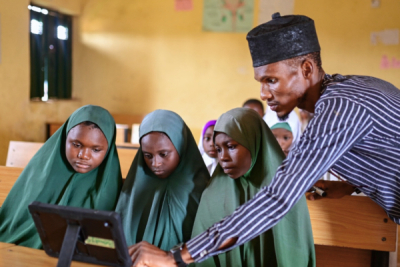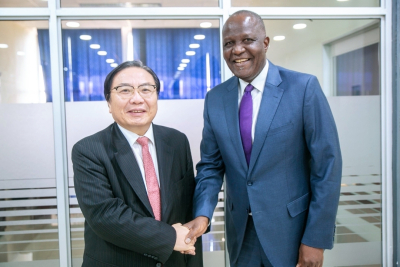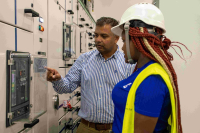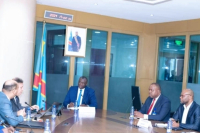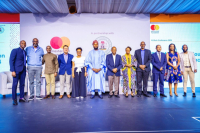
Tech (1152)
While cash remains the primary payment method in Africa, the electronic payment market is experiencing rapid growth. This surge is fueled by the emergence of various cross-border payment solutions that offer quick and affordable transactions.
On Thursday, July 18, American payment firm MasterCard announced a collaboration with Premier Bank, a Somali commercial bank. The initiative aims to launch the "Premier Payment Gateway," a digital payment platform enabling Somali businesses to accept international card payments for online purchases.
Explaining the benefits of this collaboration, Shehryar Ali, Country Manager for East Africa and the Indian Ocean Islands at MasterCard, stated that this partnership will provide Somali businesses with access to a secure online payment gateway, allowing them to accept payments, expand their customer base, and increase their revenues.
The collaboration aligns with Premier Bank's 2030 strategy to create a payment ecosystem beneficial for both cardholders and international merchants. For MasterCard, this highlights its commitment to fostering financial inclusion and supporting businesses globally, with the goal of integrating 50 million micro and small enterprises into the digital economy by 2025.
This initiative comes at a time when online payments are experiencing rapid growth in Africa, largely due to the Covid-19 pandemic. According to the "Future of Commerce: Outlook for 2024" report by digital economy consultancy TechCabal Insights, the number of online shoppers in Africa is expected to grow at an average rate of 17.9% per year between 2023 and 2027, reaching 609.3 million shoppers in 2027, up from 387.5 million in 2022.
The Premier Payment Gateway platform, launched as part of this partnership, will provide Somali businesses with the necessary tools to capitalize on the growing demand for online shopping. With 7.99 million mobile cellular connections in Somalia at the start of 2023, representing approximately 44.7% of the total population, and increasing internet accessibility, this digital payment gateway is well-positioned to meet evolving consumer expectations for a safe and seamless online shopping experience.
Samira Njoya
Several global technology companies are increasingly viewing Nigeria as a strategic hub for their African expansion, particularly in the West African sub-region.
American tech giant Microsoft has decided to reduce its presence in Nigeria. According to a Techcabal article published on Friday, July 19, "Microsoft will reduce its office space at the Kings Tower building in Ikoyi from six floors to two, suggesting a scaleback in its Nigerian operations."
This decision follows a wave of layoffs in its engineering team in May and July 2024. Additionally, Microsoft has announced the closure of its African Development Center, which was inaugurated in March 2022 in Lagos. The center aimed to develop technological and engineering solutions for Africa and the world.
"While we have made the difficult decision to close the Africa Development Centre in Nigeria, we want to emphasize that this move does not diminish our commitment to Nigeria and the region," Microsoft explained.
The reduction of Microsoft's activities in Nigeria can be attributed to the economic instability in the country, marked by the depreciation of the local currency and the accelerating rise in prices. Many companies operating in the country are reorganizing their presence to cope with this economic climate.
Meta, the parent company of Facebook and WhatsApp, is following a similar path. After laying off about thirty employees from its Nigerian team, the Menlo Park firm indicated it is reassessing its office spaces to ensure they meet the company's needs.
Adoni Conrad Quenum
Digital progress is critical for Africa's development, providing numerous benefits to the broader economic landscape. Efforts to increase internet penetration in Africa are vital for connecting rural communities, enhancing social outcomes, fostering economic growth, and improving governance.
Liberian President Joseph Nyuma Boakai, Sr. held a virtual meeting with Elon Musk, entrepreneur and CEO of SpaceX, the operator of Starlink. The Executive Mansion announced the meeting in a release dated July 21.
During the meeting, President Boakai emphasized the value of such engagements for building long-term relationships and improving Liberia’s key sectors through technology. He highlighted the potential of tech collaborations to enhance service delivery and support Liberia’s youth.
Musk discussed the Starlink program’s impact on education and healthcare, noting how improved internet access could benefit rural communities. He expressed support for advancing these initiatives while President Boakai welcomed the discussion as a significant step in fostering international partnerships and invited Musk to visit Liberia.
According to Datareportal, as of 2024, Liberia has about 1.65 million internet users, representing 30.1 % of the total population, showing a notable increase from previous years. The country also has around 859,000 active social media users, indicating growing engagement and connectivity among its citizens.
This discussion represents a crucial step in enhancing international partnerships and harnessing technological innovation, aligning with the Government’s ARREST (Agriculture, Roads, Rule of Law, Education, Sanitation, & Tourism) Agenda.
Hikmatu Bilali
For a continent experiencing a digital boom, hosting its own data becomes essential. Local data centers offer not just independence, but also enhanced security and control over sensitive information.
Consulting and management firm Essor Services announced plans to launch a data center in Burkina Faso, partnering with Costa Rican clean energy company Kaia Energy. The initiative was discussed on July 22nd with Aminata Zerbo/Sabane (photo,center), Minister of Digital Transition, Posts, and Electronic Communications.
"We presented this project to the Minister, who recognized it as a critical need for Burkina Faso's development. She expressed strong support for the initiative," said Fidèle Rinsinda Komboigo, CEO of Essor Services.
The data center, powered by a 12-megawatt waste-to-energy plant, will process, host, and transfer data internationally. Completion is targeted for November 2025.
This project aligns with the Burkinabe government's "digitalization dynamic," aiming to integrate digital technology across sectors for social and economic progress. For Komboigo, it is Essor Services’s modest contribution to the implementation of Burkina Faso's digital economy policy.
The data center will not only reduce reliance on foreign data infrastructure but also enhance national data security. Furthermore, by utilizing waste for energy generation, the project promotes sustainable practices, waste management, and local job creation.
Samira Njoya
According to the UN, Sub-Saharan Africa has the highest rates of educational exclusion in the world, with approximately 98 million children out of school. To address this issue, governments and various international partners are implementing several initiatives.
Chinese mobile phone manufacturer Tecno announced a partnership with the United Nations Children's Fund (UNICEF) on Thursday, July 18th, to support the "Nigeria Learning Passport" initiative. This digital learning platform aims to provide educational opportunities for children across Nigeria, particularly those residing in remote and underserved areas.
"Digital learning is a powerful tool in bridging educational gaps and ensuring that every child has the opportunity to learn and thrive. With TECNO's support, we are one step closer to our goal of making education accessible to all children in Nigeria, empowering them to build a brighter future," said Cristian Munduate, Unicef's representative in Nigeria.
Nigeria, like many African nations, grapples with a high rate of out-of-school children. Data from UNICEF published in 2022 reveals approximately 18.3 million children are not enrolled in school, placing Nigeria among countries with the world's highest number of out-of-school children. Insecurity is cited as a primary driver of this situation.
To address this educational crisis, the Federal Ministry of Education and UNICEF launched the "Nigeria Learning Passport" program in 2022, aligning with UNICEF's global education strategy established in 2018. The program aims to further close the educational gap and improve education quality by expanding to include offline content for 50,000 children in remote and low-income areas in 2024.
The partnership with Tecno is expected to accelerate this progress by strengthening content development, facilitating the purchase and maintenance of technical equipment, and providing professional training for educators. Notably, the program has already seen significant growth, expanding to 19 Nigerian states and registering approximately 888,000 users, ranking Nigeria second in participation globally.
Samira Njoya
Investing in digital infrastructure improves internet access across the continent, especially in underserved rural areas. This increased connectivity is crucial for integrating more people into the digital economy, reducing the digital divide, and promoting social inclusion.
The World Bank has pledged US$100 million to accelerate Zambia's digital infrastructure and expand internet access through the Digital Zambia Acceleration Project (DZAP), Minister Felix Mutati announced on July 19 on X. This initiative aims to bolster the country's digital capabilities and enhance access to digitally enabled services.
World Bank Managing Director and Chief Administration Officer Wengcai Zhang announced the project during his visit to Lusaka, where he met with Technology and Science Minister Hon. Felix Mutati. Zhang highlighted that the project will be funded through national and regional IDA funds, supplemented by US$20 million in unguaranteed commercial financing.
"The Digital Zambia Acceleration Project is designed to increase internet access and enhance digitally enabled services," said Zhang. "It aligns with government priorities and will focus on expanding broadband and last-mile infrastructure. Additionally, it will deploy digital public infrastructure to improve efficiencies in both the public and private sectors."
The DZAP will also target high-impact sectors to support digitalization and nurture employment-ready digital skills. The project is expected to be approved by the World Bank Board in March 2025. In the meantime, a Project Preparation Advance of US$6 million has been allocated to finance preliminary activities.
A Project Implementation Unit will be set up within the Smart Zambia Institute to manage and drive the government's digitization efforts. The World Bank also expressed support for Zambia hosting the World Skills Africa Competition in Livingstone in April 2025, with Zhang emphasizing the event's importance on a global scale.
This initiative aligns with Zambia's goals of creating a more inclusive and equitable society through technology, which is crucial for the country's sustainable development. According to the Zambia Inclusive Digital Economy Status Report 2022, the country's digital economy is still in its nascent stages, with a digital economy score of 45 percent and a significant digital divide. Currently, 47 percent of Zambians are not digitally included, with 56 percent of rural residents lacking digital inclusion. The report underscores the urgent need for digital transformation to improve economic participation and national development
Hikmatu Bilali
Improving digital infrastructure in Africa provides robust and reliable cloud services that meet international standards. This enhancement is crucial for the region's digital economy, promoting better internet connectivity and data management.
Schneider Electric and IXAfrica Data Centres have launched East Africa’s largest hyper cloud data centre, NBOX1, in Nairobi, Shneider Electric announced July 18. The Tier 3+ facility is now operational, offering a carrier-neutral, AI-ready environment for cloud, colocation, and connectivity services.
Powered by Schneider Electric's MV and LV switchgear and Kenya's renewable energy, NBOX1 promises stable and reliable services. It aims to attract hyperscale and internet customers with a performance on par with top facilities in North America and Western Europe.
“We believe that sustainable practices are essential for the future of data centres, and we are proud to partner with organizations like IXAfrica to create environmentally conscious and innovative digital habitats for the evolving technological landscape," said Mouna Essa Egh, Schneider Electric’s secure power VP for the Middle East & Africa
The data centre, backed by a $50 million investment from Helios, is strategically located in Africa’s 'Digital Savannah,' serving over 300 million people and a vibrant tech ecosystem.
This development is significant for Africa's digital growth. According to Africa Data Center Market Analysis (2017-2029) by Mordor Intelligence, the Africa Data Center Market is projected to have a capacity of 0.69 thousand MW in 2024 and is expected to grow to 1.23 thousand MW by 2029, with a CAGR of 12.34%. Additionally, the market is forecasted to generate colocation revenue of USD 750.2 million in 2024, reaching USD 1,709.6 million by 2029, growing at a CAGR of 17.91% during this period. The launch of NBOX1 is a crucial step in enhancing the technological capabilities and connectivity in East Africa, fostering further development in the region's digital landscape
Hikmatu Bilali
Establishing regulations that align with international best practices can help African e-commerce platforms improve their competitiveness on the global stage. This can facilitate cross-border e-commerce and open up new markets for businesses on the continent.
The Nigerian government plans to regulate e-commerce platforms and introduce cyber insurance for users. This initiative is part of the draft National Digital Economy and E-Governance Bill under review by the National Assembly.
Sponsored by the Ministry of Communications, Innovation, and Digital Economy, the Bill is in the public engagement phase. It requires e-commerce platforms to provide clear and accurate information about sellers, goods, services, and transaction terms.
During a media engagement in Abuja on July 9, Minister of Communications, Innovation, and Digital Economy Dr. Bosun Tijani said the Bill would create a legal framework to accelerate Nigeria's digital economy. "This Bill will support the growth and transformation of Nigeria’s economy through technology," he said.
Section 40 of the Bill mandates the National Insurance Commission (NAICOM) and the National Information Technology Development Agency (NITDA) to develop cyber insurance regulations for electronic commerce.
Section 39 specifies that e-commerce sellers must provide legal names, addresses, and contact details, ensuring effective consumer communication and legal process service. It also mandates detailed descriptions of goods or services and clear terms and conditions, including payment methods, returns, and refund policies.
If passed, major e-commerce platforms, as well as smaller players, would face stricter regulations and potential new taxes and levies imposed by NITDA. Non-compliance could result in fines.
The proposed legislation is poised to impact the country's rapidly growing e-commerce sector significantly. According to the European Company Database (ECDB) report titled eCommerce Market in Nigeria, this sector is expected to generate $2.68 billion in revenue by 2024 and grow at a compound annual growth rate of 12.8%, reaching $4.34 billion by 2028.
Hikmatu Bilali
In 2019, the Democratic Republic of Congo (DRC) adopted a National Digital Plan to guide the development of its digital economy. This strategic framework aims to foster digital transformation across various sectors, enhancing economic growth and improving public services, with various initiatives already being carried out to advance the plan.
The Democratic Republic of Congo (DRC) is exploring the establishment of a National Unified Information Center, according to a statement from the Ministry of Posts, Telecommunications, and Digitalization (PT-N).
Minister Augustin Kibassa Maliba (photo, center) met with Ashraf Attia, President of the Egyptian technology group Omega Gate Tech, on July 18 to discuss the initiative. According to Khaled Rhaïem, Omega Gate Tech's DRC representative, the discussions aligned with the DRC's ongoing digital transformation strategy.
"We discussed the construction of the National Unified Information Center. This approach perfectly aligns with President Félix Tshisekedi's vision. The center will consolidate all census databases and implement 5G technology," Rhaïem said.
The proposed center aligns with the National Digital Plan Horizon 2025 (PNN 2025), which aims to modernize the DRC through accelerated digitalization and key infrastructure development with 48% of its 69 projects already underway, 15 completed and 18 in the operationalization phase (according to the PNN 2025 mid-term review published in December 2023).
The National Unified Information Center envisions a centralized platform for collecting, managing, and disseminating critical national data across sectors like security, health, education, and the economy.
Omega Gate Tech, with its presence in Egypt, UAE, Libya, and Saudi Arabia, is seen as a potential partner to support the DRC's digital transformation. Their involvement could pave the way for significant technological advancements and a promising digital future for the country.
Samira Njoya
Information and Communication Technologies (ICT) provide greater opportunities for creativity and learning at preschool and primary levels. However, access to digital education remains insufficient in Africa due to the lack of preparedness for integrating digital technologies into early learning.
The Mastercard Foundation, in partnership with the Federal Government of Nigeria, hosted its first EdTech conference in Abuja from Monday, July 8 to Wednesday, July 10. Themed "Education Tech for Resilient, Inclusive Learning In Africa," the conference aimed to discuss the integration of technology into learning systems across Africa.
The event concluded with the adoption of 10 key actions to strengthen the EdTech ecosystem in Africa:
Champion local innovation through supportive EdTech policies, with governments as leaders, proactive enablers, and consumers of quality content and delivery mechanisms.
Harmonize cross-sector policy by coordinating inter-ministerial strategies, plans, and initiatives on technology-enabled access to education for all.
Underwrite foundational infrastructure through creative use of resources such as Universal Service Funds to invest in electricity, the internet, devices, and dedicated infrastructure for education programs.
Drive decisions with data by investing in government systems and capabilities for timely collection, analysis, and informed decision-making.
Enhance delivery capacity along the EdTech value chain by upskilling teachers to deliver learning using EdTech and supporting leaders in education systems to work with tech-enabled processes and data.
Systematize EdTech integration by introducing (where nonexistent) and enforcing clear, context-relevant standards for technology integration into the educational curriculum.
Guide context-relevant innovation with clear and timely guidelines and approval processes for content, tools, and licenses to encourage innovation, investment, and technology mainstreaming.
Diversify learning pathways for out-of-school youth by developing flexible technology-enabled alternatives for learning, accredited certification, and re-entry to the formal education system.
Lower access barriers to EdTech through strategic private-public partnerships that support responsive, evidence-based policy and affordable solutions for all.
Embed responsive inclusivity (gender equity, persons with disabilities and refugees and displaced persons) in policy and innovation processes, centering and engaging diverse young people throughout development and delivery.
The conference is part of the Mastercard Foundation's efforts to promote digital education in Africa. It coincides with the African Union's declaration of 2024 as the "Year of Education," urging all governments to intensify efforts to ensure quality education for all.
The African Union's Digital Education Strategy (2023-2028) and its implementation plan call for African countries to develop national digital education strategies. They aim for at least 50% of educational institutions to have safe and secure high-speed connectivity at significantly less than $25 per Mbps per month, at least 20% of students and 50% of teachers on the continent to have access to digital devices by 2027, and one-third of students and all teachers to have access by 2030.
Samira Njoya
More...
Africa is the world's youngest continent, with over 60% of its 1.4 billion people under 25. This youth demographic offers a significant opportunity to nurture a tech-savvy generation that can lead the continent's digital future and drive economic growth. However, many African organizations still struggle to find the necessary tech skills to support their digital transformation efforts.
Nigerian Software solutions provider CodeGarageAfrica launched the "1000 Lines of Code" initiative on July 15 in Ibadan, Nigeria. The initiative aims at empowering 1000 senior secondary students through technology and is set to inspire and educate the next generation of tech enthusiasts.
1000 Lines of Code Commences Today!
— codegarage_africa (@CodegarageA) July 15, 2024
We are thrilled to announce the commencement of the #1000LinesofCode event today!
A big thank you to our amazing partners:@oyostategovt@386konsult @zeeh_africa
Stay tuned for updates and highlights as we kickstart!#CodeGarageAfrica pic.twitter.com/5AxvMnfQFx
The event, held at the International Conference Center in Ibadan will last a week, from July 15 to July 19, 2024. It introduces 1000 senior secondary students from 110 schools across 11 local governments in Ibadan to coding and technology. The program features hands-on workshops, industry talks, and interactive sessions designed to ignite a passion for computer science. Participants will engage in coding challenges, receive mentorship, and explore software development.
A 2022 report by SAP Africa, an enterprise software and software-related services provider, titled "Africa’s Tech Skills Scarcity Revealed," highlights that four in five organizations across the continent are negatively impacted by a lack of tech skills. In Nigeria, all surveyed organizations reported some effect from this skills gap, with 47% experiencing employee turnover or the risk thereof due to inadequate tech skills, and 60% suffering customer loss for the same reason. Bridging this gap is crucial for Africa's digital transformation and economic growth.
Hikmatu Bilali
Streamlining vehicle registration and documentation processes aids in combating vehicle-related crimes such as terrorism, banditry, kidnapping, and armed robbery. Digital systems can be adapted to provide real-time data to help law enforcement agencies track and recover stolen vehicles, enhancing overall security.
In a recent development, the Inspector-General of Police (IGP), Kayode Adeolu Egbetokun, has ordered the immediate suspension of the proposed enforcement of the digitalized Central Motor Registry (e-CMR), which was initially set to commence on July 29, 2024. This directive was announced in a press release dated July 14, just a day after the Nigeria Police Force (NPF) announced the deadline for vehicle owners to register for the e-CMR, costing N5,375 per vehicle.
The decision aims to provide sufficient time for mass enlightenment and education of all citizens and residents on the e-CMR process, its benefits, and its effectiveness in addressing vehicle-related crimes and protecting vehicle ownership.
"The Inspector-General of Police, IGP Kayode Adeolu Egbetokun, Ph.D., NPM, has ordered an immediate suspension of the proposed enforcement of the e-CMR initially scheduled to commence on the 29th of July, 2024. This is to give ample opportunity for mass enlightenment and education of all citizens and residents on the process, benefits and effectiveness in solving the challenge of vehicle-related crimes, and protection of individual and corporate vehicle ownership," the statement read.
In light of the suspension, the IGP has instructed all police officers to refrain from requesting e-CMR certificates. Any officer found extorting or exploiting the public under the guise of enforcing e-CMR compliance will face strict sanctions. The NPF clarified that the e-CMR is not intended as a revenue-generating platform but as a digital policing initiative aimed at enhancing public safety and security.
The e-CMR system is designed to enhance the safety and security of all vehicle types, including motorcycles. By collecting data from vehicle owners, the system can flag vehicles if reported stolen, provide the police with a comprehensive real-time database, prevent multiple registrations, and integrate biometric and other data into a national database. This integration will contribute to overall security and streamline incident reporting across various government agencies.
This suspension provides an opportunity for better public understanding and preparation for the eventual implementation of the e-CMR system, ensuring it effectively enhances vehicle security and ownership protection.
The Central Motor Registry (CMR) was initially launched in December 2022 to enable citizens to report stolen vehicles and assist in processing motor vehicle information, supporting police operations, and enhancing national security. This digitalization effort is part of a broader trend where African nations are increasingly adopting digital solutions to combat crime, improve governance, and streamline services.
Hikmatu Bilali
The digital sector offers numerous job opportunities for young people. By acquiring the right skills, they can take advantage of these opportunities and integrate more easily into the job market.
Chinese technology giant Huawei announced plans to train an additional 4,000 individuals in Information and Communication Technologies (ICT) in Mauritius by 2028. The commitment was unveiled on July 10th at the launch ceremony of DigiTalent 3.0, a program designed to address the nation's growing need for a skilled digital workforce.
"Mauritius has always been a pioneer in regional innovation. Our strategic investments in ICT infrastructure, combined with our commitment to fostering a knowledge-based economy, have laid a solid foundation for our digital future. Continuous training and skill enhancement are essential. Huawei's talent ecosystem is a brilliant example of how we can work together to build a thriving ICT talent pool in our country," said Deepak Balgobin, the Mauritian Minister of Information Technology, Communication, and Innovation.
This initiative aligns with Huawei's global strategy of cultivating digital talent in various countries. The approach emphasizes building ecosystems for educators and students, offering digital skills training to industry partners, and collaborating with governments on digital transformation initiatives.
In Mauritius, Huawei's contributions have resulted in the training of over 35 instructors and the development of courses in Artificial Intelligence, 5G, Datacom, and Cloud Computing. Over 350 students and professionals have earned Huawei's HCIA certification in recent years. The company has also established partnerships with seven local universities.
These combined efforts are expected to propel Mauritius towards achieving the objectives outlined in its "Digital Mauritius 2030" strategy. This national plan entails significant investments in infrastructure, digital skills training, and the transition to digital administration, all aimed at propelling the nation's digital sector. According to official figures, this sector thrived in 2022, experiencing a 6.5% growth rate and remaining the only sector unaffected by the global health crisis.
Samira Njoya
The Malagasy government has outlined an ambitious plan to harness the power of the technological revolution. They are actively pursuing a range of initiatives aimed at achieving substantial progress in a short timeframe.
On Wednesday, July 10, Malagasy Minister of Digital Development, Posts and Telecommunications (MNDPT), Tahina Razafindramalo, welcomed a delegation from Onepoint and Global Business Network International, two French companies specializing in digital technology, for a working meeting.
According to the ministry's statement, discussions focused on several key topics, including the interoperability of information systems and data used by the government, the implementation of e-governance, and the impacts of digital transformation on the Malagasy government and its citizens.
The meeting aligns with the government's ongoing efforts to strengthen the digital sector through innovative technological partnerships. Recently, the government visited South Korea to meet potential partners capable of supporting the digitalization of the agricultural sector, demonstrating its commitment to modernizing various sectors through technology.
Following the meeting, a partnership was announced with Onepoint to organize an event on July 11 and 12 titled "Mastering Data to Transform Madagascar." This event brings together representatives from both the public and private sectors to discuss the importance of data management in the country's digital transformation.
Global Business Network International, established in October 2004, specializes in computer programming and assisting companies in their digital transitions. Onepoint is known for its unique approach that combines technology with human intelligence to support its clients' digital transformation. These future collaborations promise to bring innovative and sustainable solutions to the digital development of Madagascar.
Samira Njoya


